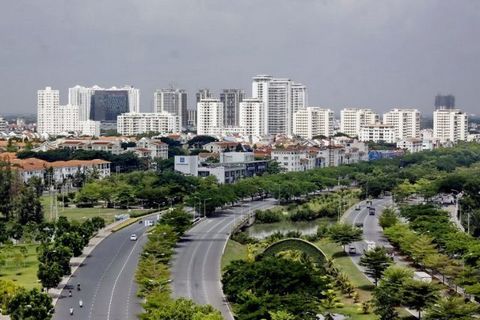 |
|
Phu My Hung Urban Area in HCM City. The real estate market in HCM City froze in the first quarter as demand and purchasing power tumbled due to COVID-19.
|
According to HoREA chairman Le Hoang Chau, bonds had become a key tool for real estate firms to raise funds for projects. The association suggested that real estate firms be permitted to continue raising funds from bond issuances as they faced difficulties from the outbreak.
From January to March, about 53,000 units went on sale but only 14 per cent were sold – the lowest rate in four years. Eight hundred real estate trading houses, or 80 per cent of the total, were closed during the period.
In total, 94 per cent of real estate firms closed, while new businesses declined by 12 per cent on-year.
The real estate market had frozen in the first quarter, Chau said. Trading volume fell 70 per cent on-year and total revenue slumped 80 per cent on-year, leading to a shortage of cash and liquidity.
Policies should be amended to assist the development of the corporate bond market, while promoting transparency and protecting the rights and benefits of investors and companies.
It is not the first time real estate firms have asked for the loosening of corporate bond regulations.
Local property developers are facing uncertainties as the Government and the State Bank of Vietnam (SBV) are trying to raise the standards for real estate bond issuance.
From 2019, banks were asked to cut the ratio of short-term loans used for mid-term and long-term lending to a maximum of 30 per cent from 40-45 per cent to strengthen the banking sector and lower financial risks.
The central bank on November 15, 2019 issued a circular to restrict local banks from making loans for customers to trade in corporate bonds.
Under the circular, a bank must record a less-than-3 per cent bad debt rate if it wanted to fund corporate bond buying. Customers cannot take out loans to trade corporate bonds if they used the bonds themselves as collateral, and total corporate bond-lending must only account for a maximum of 5 per cent of the bank’s charter capital.
Real estate firms in 2019 raised a total of VND106.5 trillion (US$4.56 billion) from bond issuances. The figure was equal to 38 per cent of the economy’s total. Eighty-four per cent of the firms had the value of bond issuances triple their equity total, and average bond interest rate was 10.3 per cent per annum.
In the first three months of 2020, total corporate bonds raised in Viet Nam were worth VND37.3 trillion, with real estate firms accounting for 55 per cent of the total and interest rates averaging 10.3 per cent per annum. — VNS

Real estate to remain good investment after Covid-19 ends
Economists believe that real estate will remain a safe shelter for investors, and will still bring attractive profits in the post-Covid-19 period.

Changes required for central real estate
Despite going through a quiet period due to the effects of the coronavirus outbreak, investors and real estate businesses in Danang and the central region are striving to remove difficulties to maintain stable operations and adapt to a new direction.
 The HCM City Real Estate Association (HoREA) has asked for corporate bond regulations to be loosened to help businesses get through the COVID-19 pandemic, local media have reported.
The HCM City Real Estate Association (HoREA) has asked for corporate bond regulations to be loosened to help businesses get through the COVID-19 pandemic, local media have reported.